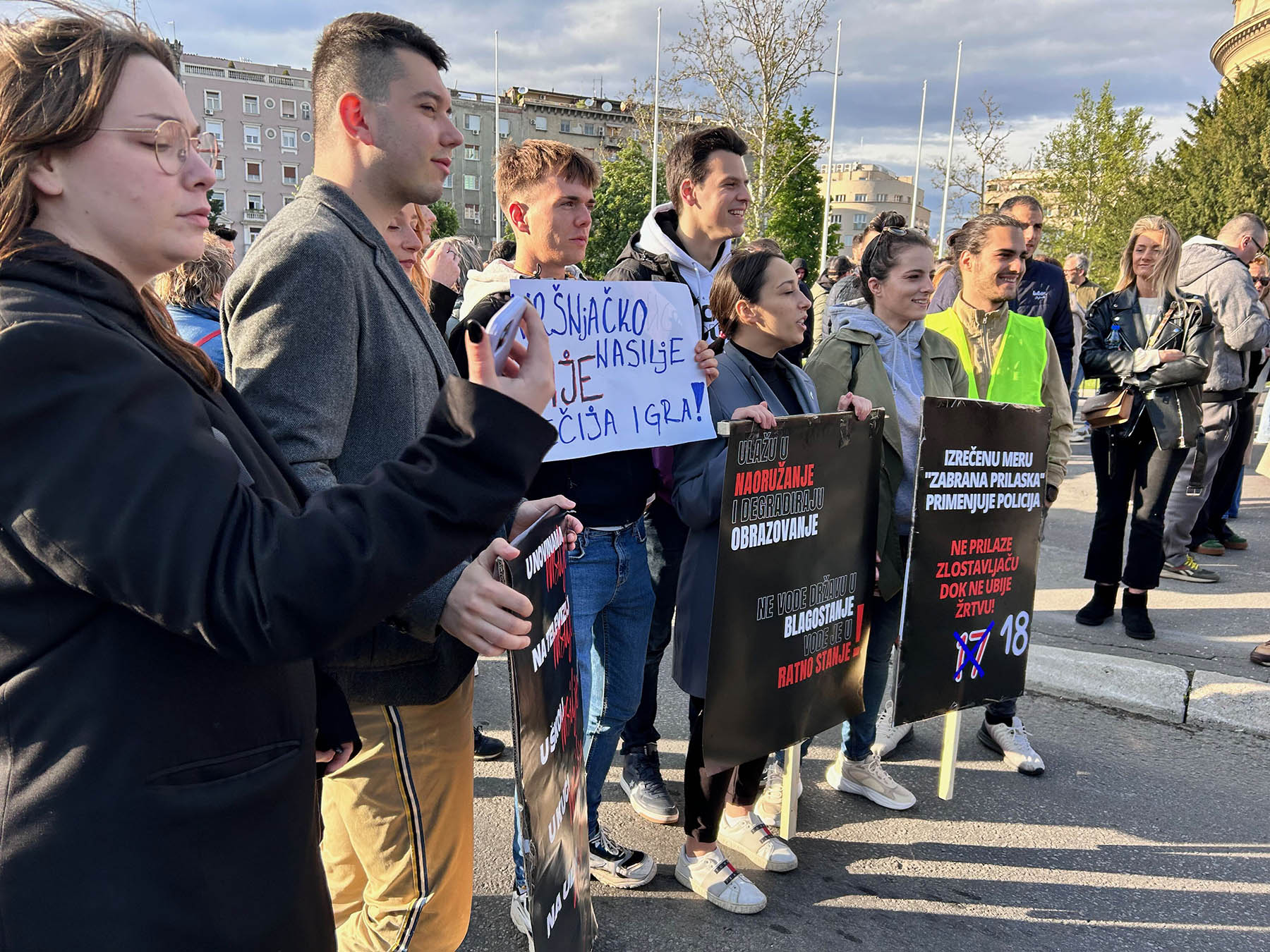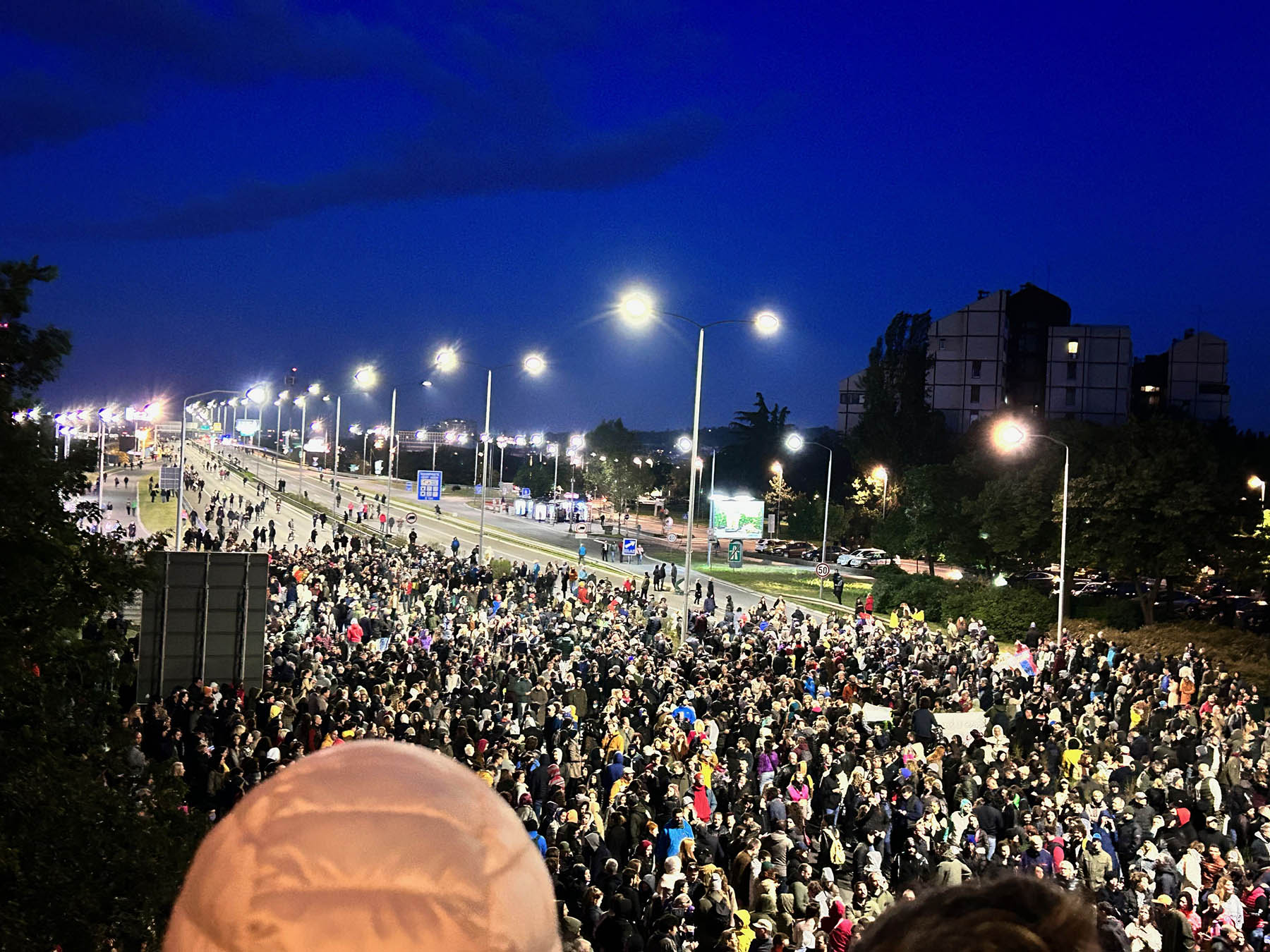Belgrade, protests of 15 May 2023 – M.Moratti
After the massacres that have marked Serbia in recent weeks, street demonstrations contest the government, pointing the finger above all at the situation of the media in the country, which according to critics have created and fomented a climate of intolerance and violence over the years
Protests continue in Belgrade. After the demonstrations on 8, 12 and 19 May, preparations are made for a weekend of high tension with the government demonstration organized on 26 May and another demonstration organized by the opposition the following day.
The demonstrations managed to bring tens of thousands of people to the streets and block the main arteries of the Serbian capital. If initially composure and pain for the victims prevailed of the massacres that have marked the country in recent weeksthe protests have gradually articulated precise requests to the government, on which the executive has so far, however, refused to comment.
Some concern the situation of the media in Serbia and the passivity of the institutions in countering the violence present in the media space. The requests addressed to the government ask for a ban on media and tabloids that promote violence and hatred, and for an end to programs – such as some reality shows – that promote aggressive, violent and immoral behavior and finally for the resignation of the entire institution media regulator (REM).
The connection between the massacres and the demands of the protests in Belgrade
While at the moment it seems difficult to find a direct causal link between the mass massacres and the demands of the people who protest, the accusations leveled against the government are those of having created a media system that not only tolerates, but actually promotes violence.
This connection emerges clearly in the case of the second massacre. The perpetrator of the Mladenovac massacre had as his idol a certain Aleksandar “Kristijan” Golubović, a well-known star of some reality shows, including “Zadruga”, broadcast on Pink television.
Golubović’s “curriculum” speaks volumes: multiple offender for drugs and armed robberies, MMA fighter, he boasted, rightly or wrongly, of friendships with characters such as Arkan, a notorious paramilitary leader during the conflicts of the 90s and Ulemek “Legija”, the person responsible for the killing of Prime Minister Zoran Đinđić.
In recent years, Golubović has become a star of reality shows that competed for him. In the course of his participation in reality shows, Golubović has become the protagonist of numerous incidents of violence , insults, fights. In one of these episodes Golubović strangles her partner until she is knocked unconscious. Golubović’s is not an isolated case, similar episodes they are featured abundantly in reality television and on Serbian television. Not only are common offenders guested on reality TV, war criminals are also regularly guested on talk shows as experts on geopolitics or military matters in what is a real one glorification of violence.
The role of private TVs
Private television stations RTV Pink and Happy TV are most likely to broadcast reality shows and violent programming. Nonetheless, these two televisions, last July they were awarded for the second consecutive time a national frequency which allows them to broadcast over the entire territory of Serbia.
The assignment of these frequencies has been criticized by civil society and trade associations: the fact that at the time there had been numerous complaints about incitement to hatred and violence some broadcasts had not been taken into account by the REM which had re-assigned the frequencies to RTV Pink, Happy TV as well as B92 and Prva TV, two other private TVs, still close to the government but whose contents did not attract the same criticism as RTV Happy and Pink.
This decision was also criticized in the progress report on Serbia’s accession to the EU and the ODIHR report on the 2022 elections, which had underlined that the REM had tolerated violations of the electoral campaign rules by the four nationwide televisions.
In recent years, Happy and Pink televisions have often been at the center of controversy and scandals but have never been subject to significant sanctions. The reason for this, most likely, is that these broadcasters have a very close connection with politics and are considered essentially gods personal tools of political power in Serbia and in particular of President Vučić who is a regular guest of such broadcasts: one of first appearances on Vučić’s TV after the massacres it was right on the screens of Happy TV.
From this point of view, as underlined by the professors of the Faculty of Political Sciences Jelena Đorđević and Rade Veljanovski in un’intervista per Radio Free Europe the violence in the tones and contents of the televisions is nothing but the reflection of the political discourse and at the same time, these televisions are the pillars on which the Vučić regime rests, in a similar way to what happened in the 1960s 90 with state television.
The comments of the REM and of the televisions in question
Given the demands of the protests, the REM has taken defensive positions. In a statement released on May 11, President Olivera Zekić he said that while their resignation should be discussed in Parliament, it should also be discussed how a part of society and the media want to present the REM as the culprit of these terrible tragedies in Serbia.
Zekic he then reiterated that the repeated attacks against the REM are not only shameful, but could even lead to further violence. The President’s statements were followed by similar statements by the EMN Vice-President, Milorad Vukašinović a few days later: “I fear that the instigators of the attacks against the integrity of the REM […] are located in the headquarters of some media”. Later pressed on the role of Kristijan Golubović in television, the response of Vukašinović was that media regulators cannot limit the rights of citizens who have already served sentences, unless those sentences so stipulate.
More critical, however, was another member of the REM, Judita Popovic, who admitted that for years the media have favored incitement to hatred, violence and discrimination and that no one has reacted, but rather that certain media have been rewarded by the assignment of national frequencies. Resignation not are sufficient Popović said, REM members should be responsible for certain situations.
The words of the REM members were also echoed by the Minister of Information, Mihailo Jovanovic which rejected as unacceptable the public’s requests to close both RTV Pink and Happy TV, given that such requests would be contrary to freedom of expression, a fundamental pillar of any democratic society.
A hint of self-criticism comes from Željko Mitrović the owner of Pink who entered the house where the reality show “Zadruga” is held and he announced that this is the last season of the reality show, which will change from next year. Later Mitrović himself has announced that “Zadruga” will cease to be broadcast within ten days at the latest and that this was a request made by Vučić himself. We will see if the words will be followed by deeds.
Conclusions
The protests are creating a lot of nervousness within the Serbian government and seem to have pointed the finger at the passivity of the REM and the sensationalist approach of private national televisions, which are often the favorite stage of the SNS, the president’s party Vucic.
The REM and the Minister of Information have entrenched themselves behind a formal approach of defense of the institutions and freedom of the right of expression, without however emphasizing how the same right of expression must be regulated within Serbian society. In this sense it is enlightening an article of the Center for Investigative Journalism in Serbia (CINS) which explains that the problems do not arise from the fact that the regulations are not adequate but from the fact that they are not applied.
For example, in January of this year alone, within the famous reality show “Zadruga”, there were more than ten controversial episodes as documented in a complaint filed by the Institute for Media and Diversity (MDI). This complaint has not been acted upon: in the last 5 years the REM has not ordered any measures against RTV Pink for its problematic contents and this happens because the law is not applied adequately and broadcasts with high audience ratings such as reality shows they are considered untouchable. As demonstrated by the CINS, the REM has remained silent in these cases. And it is precisely against this silence that citizens are now protesting.
| This publication was produced in the framework of the Media Freedom Rapid Response (MFRR), co-funded by the European Commission. The responsibility for the contents of this publication lies with Osservatorio Balcani e Caucaso Transeuropa and does not in any way reflect the opinion of the European Union. |
Have you thought about a subscription to OBC Transeuropa? You will support our work and receive preview articles and more content. Subscribers to OBCT!




